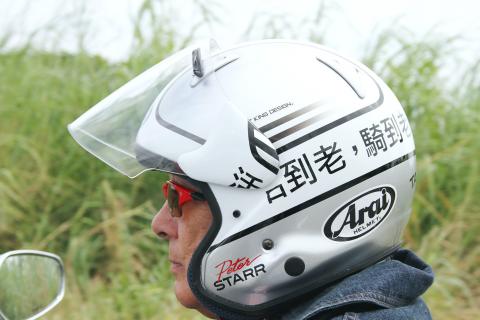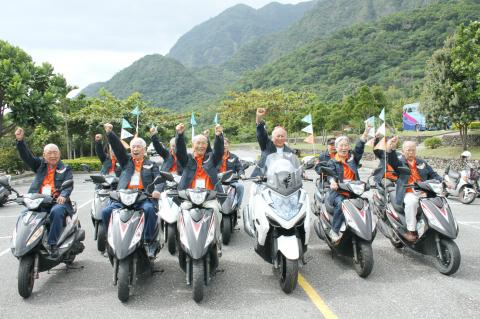American film producer Peter Starr is in his late 60s and a lifelong motorcycle enthusiast. Having visited Taiwan last year with a plan to make a documentary about Taiwan’s Grand Riders, a group of elderly scooter hobbyists, he is returning to the nation this month with a group of elderly American riders who have been invited to accompany a larger Taiwanese group of riders on a nation-wide tour.
A Taichung-based senior citizen’s welfare foundation, the Hondao Foundation (弘道老人基金會), organizes the annual trip.
“Our group is scheduled to arrive in Taipei on Sunday, and we then travel to Taichung the next day to take delivery of our scooters,” Starr said in an email interview with the Taipei Times. “There will be a reception for all of us with Taichung Mayor [Jason] Hu (胡志強), then we’re off later in the morning.”

Photo Courtesy of Peter Starr
The Grand Riders are scheduled to arrive back in Taipei on Oct. 22, where they’ll be treated to a special screening of Go Grandriders (不老騎士), a 90-minute documentary by 31-year-old Taiwanese director Hua Tien-hao (華天灝), he said.
An article Starr wrote in April’s edition of the Motorcyclist magazine described the 1,125km road trip he made in 2011 with local seniors over the age of 80. Many of the riders had cancer or degenerative heart disease, Starr said, noting that most of them had arthritis as well.
“But it was a fantastic trip,” he said.

Photo Courtesy of Peter Starr
When Starr later learned that Hua had already made his own 90-minute documentary of a cross-country scooter brigade of octogenarians hitting the road in Taiwan, he decided to cancel his plans for his own movie. But he continues to ride with the group every year.
“When I found out director Hua was already well into producing his movie on the same subject I was looking at, I backed off,” he said. “But I am still enthusiastic about doing this second trip with a group of American riders coming along, too, and we’re all looking forward to our upcoming adventures on the roads of Taiwan — from Taichung to Alishan (阿里山), Sun Moon Lake (日月潭) and all over.”
Starr, 69, flew to Taipei in September and was shown a preview of Hua’s movie, and now he’s coming back for the documentary’s Taipei premiere on Oct. 22 and his reunion with the Grand Riders on Oct. 15.
When asked why he is returning to Taiwan even though his plans for a Grand Riders documentary have been shelved, Starr said: “I want to promote the relationship of the group of elderly riders in Taiwan with elderly riders in the America. I not only want to keep this Grand Riders thing alive, but I also want to help it grow, too.”
Starr initially came to Taiwan in 2011, he said, because he was inspired by a popular TV commercial about the Grand Riders that went viral on YouTube, getting over 4 million hits.
‘’I decided then and there I wanted to ride with them and make a documentary about their adventure,” he said.
The theme of his planned documentary was going to be about ‘’having a dream and a purpose for living out your years productively,” he added, noting: “After watching that YouTube video I was left with a gargantuan lump in my throat and far-from-dry eyes.”
There will be an official start with government officials in attendance and TV cameras in tow, he said. From Taichung, the Grand Riders will head south, stop overnight in Chiayi and then head up to Alishan, he said.
“There’s no stopping us,” he added.

Oct. 21 to Oct. 27 Sanbanqiao Cemetery (三板橋) was once reserved for prominent Japanese residents of Taipei, including former governor-general Motojiro Akashi, who died in Japan in 1919 but requested to be buried in Taiwan. Akashi may have reconsidered his decision if he had known that by the 1980s, his grave had been overrun by the city’s largest illegal settlement, which contained more than 1,000 households and a bustling market with around 170 stalls. Fans of Taiwan New Cinema would recognize the slum, as it was featured in several of director Wan Jen’s (萬仁) films about Taipei’s disadvantaged, including The Sandwich

“Wish You Luck is not just a culinary experience, it’s a continuation of our cultural tradition,” says James Vuong (王豪豐), owner of the Daan District (大安) Hong Kong diner. On every corner of Kowloon, diners pack shoulder-to-shoulder over strong brews of Hong-Kong-style milk tea, chowing down on French Toast and Cantonese noodles. Hong Kong’s ubiquitous diner-style teahouses, known as chachaanteng (茶餐廳), have been a cultural staple of the city since the 1950s. “They play an essential role in the daily lives of Hongkongers,” says Vuong. Wish You Luck (祝您行運) offers that same vibrant melting pot of culture and cuisine. In

Much noise has been made lately on X (Twitter), where posters both famed and not have contended that Taiwan is stupid for eliminating nuclear power, which, the comments imply, is necessary to provide the nation with power in the event of a blockade. This widely circulated claim, typically made by nuclear power proponents, is rank nonsense. In 2021, Ian Easton, an expert on Taiwan’s defenses and the plans of the People’s Liberation Army (PLA) to break them, discussed the targeting of nuclear power plants in wartime (“Ian Easton On Taiwan: Are Taiwan’s nuclear plants safe from Beijing?”, April 12, 2021). The

Artificial intelligence could help reduce some of the most contentious culture war divisions through a mediation process, researchers say. Experts say a system that can create group statements that reflect majority and minority views is able to help people find common ground. Chris Summerfield, a co-author of the research from the University of Oxford, who worked at Google DeepMind at the time the study was conducted, said the AI tool could have multiple purposes. “What I would like to see it used for is to give political leaders ... a better sense of what people ... really think,” he said, noting surveys gave